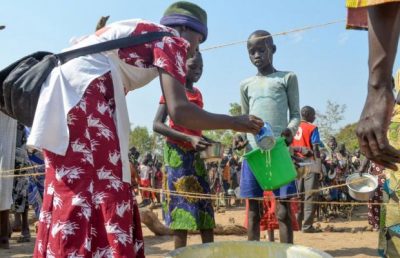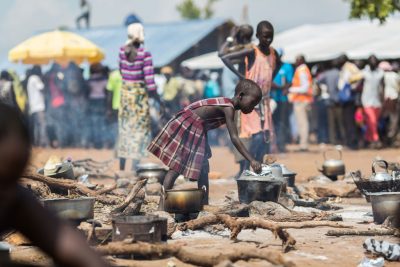Moses Mukitale
By
Gloria Nakiyimba
The Government of Uganda and UN Refugee Agency-UNHCR are implementing measures to contain an outbreak of Cholera in Pagirinya refugee camp in Adjuman.
49 South Sudanese refugees and a Ugandan national have been confirmed to have contracted the disease attributed to poor sanitation.
Pagirinya is currently hosting more than 30,000 South Sudanese refugees.
According to a statement from UNCHR, measures include quarantine of patients, restriction of sale of fresh produce, treating water points with chlorine, garbage cleaning, strengthening of hand-washing facilities and the distribution of water guards.
“Those who have contracted the disease are having their houses disinfected and their water supply drained while a door to door awareness-raising campaign takes place,” read part of the statement issued Thursday.
Cholera is an acute infectious disease, contracted through consumption of food and water contaminated with human feces. It presents with acute watery diarrhea and vomiting.
“We have received a large number of young children as refugees over the last month or so, who are particularly vulnerable to this possibly lethal disease,” said Bornwell Kantande acting UNCHR representative to Uganda.
Uganda’s Ministry of Health and other health partners are continuing to reduce the number of people living in these reception centers as quickly as possible, not only to reduce the risk of disease outbreaks, but so that these people can begin to rebuild their lives as soon as possible.
Uganda Red Cross has put up several birth shelters in the camps and the neighboring communities. URC is also carrying out mass water treatment.
“We have activated our wash interventions in that community. Our health team is sensitizing the refugees as well as the communities. We are giving out water treatment chemicals to households,” said Irene Nakasiita the URC spokesperson.
More than 80,000 South Sudanese refugees have fled to Uganda since violence broke out in Juba in July.
Photo – Will Swanson/UNHCR
Appeal for donor response on food rations
The office of the Prime Minister, UNHCR and World Food Program have appealed to donors to urgently speed contributions to the humanitarian response to refugees to end a funding shortage that has forced a revision of survival rations.
Food rations or cash assistance have been reduced by 50 percent due to low levels of funding, coupled with a high influx of refugees fleeing fighting in South Sudan.
“Refugees who have been identified as particularly vulnerable, such as the elderly, orphans, the chronically ill, and those in need of treatment for malnutrition, will continue to receive a full ration,” said OPM Commissioner for Refugees David Apollo Kazungu.
Refugees receiving full rations are provided with 2,122 calories of food per person per day, in line with the minimum recommended daily allowance, during their first year, decreasing as they become increasingly self-reliant during their time in Uganda.
Other refugees receive cash assistance in place of food rations, which also provides them with the opportunity to exercise greater personal choice.
“We are grateful to donors for their unwavering support so far but we appeal to the international community to do more. People are fleeing because they are afraid for their lives. But our message to the international community; we need your help to meet their basic needs until they are able to stand on their own two feet,” Kazungu pointed out.
WFP requires approximately US$7 million every month to provide life-saving food assistance to refugees in Uganda. Despite the generous support of donors, the humanitarian response requires an additional US$ 20million to restore full food rations to refugees for the rest of the year.
“We have done everything we can to avoid this, but we have been left with no option but to reduce food assistance for many of the refugees in Uganda, in order to stretch available resources and prioritize the most vulnerable new arrivals,” said Mike Sackett, WFP’s acting Country Director for Uganda.




No Comments Yet!
You can be first to comment this post!